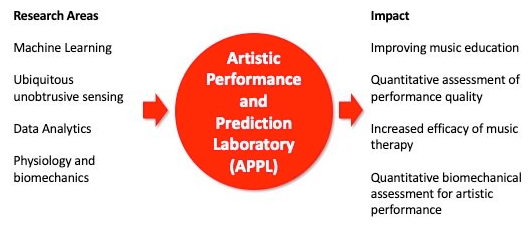Teaming for Interdisciplinary Research Pre-Seed Program
Development of an Artistic Performance and Prediction Lab

Development of an Artistic Performance and Prediction Lab

An innovative partnership between faculty in the Hugh Hodgson School of Music and the College of Engineering will discuss the development of an Artistic Performance and Prediction Laboratory (APPL). The APPL will be a technology-infused space for artisticperformances that enable real-time data collection, audio-visual capture technology, “smart” instruments, and computational platforms for machine learning and data analytics. The APPL will be the basis for research and scholarship in areas such as the biomechanics of artistic performances, quantitative and qualitative assessment of music education, quantitative analysis of the efficacy of music therapy, and the relationship between instrument proficiency and perceived quality.
Artistic performances such as music and dance have been part of human culture for over 40,000 years; there is no human culture at any time or place in history that did not demonstrate evidence of music-making and dancing. Some researchers posit that humans communicated musically before the development of language and the spoken word. Simply put, music and moving are a fundamental part of the human experience, and knowing more about these processes allow us to know more about ourselves.
While music and dance have been part of human culture for thousands of years, it is only in the last few centuries that quantitative methods have been applied to an understanding of the underlining physics of human motion and sound.Advances in the laws of motion starting with Newton’s Principia led to fundamental advances in the theory of mechanics, vibrations, and acoustics throughout the late 1800s and early 1900s, and these theoretical foundations increased the understanding of string vibration and sound production from musical instruments. The theoretical foundations of mechanics were combined with advances in an understanding of human physiology to create the field of biomechanics, leading to an increased understanding of how humans interface with musical instruments. The discovery of various types of transducer materials throughout the 1900s combined with the invention of the transistor and, subsequently, the microprocessor has led to the miniaturization and commoditization of many types of sensors for measurement of physical phenomena. These methods of data collection, when combined with data analytics and machine learning, are leading to fundamental advances in an understanding of the arts and new means of artistic expression.
Our Interdisciplinary Research Group will leverage the collective strengths and passions of UGA faculty and identify opportunities for national and international leadership in specific areas of research and scholarship. The discussions will be focused around the concept of the APPL, a space where a variety of artistic performances can occur and has the technology that enables unobtrusive real-time measurement, data analytics, signal processing, and machine learning. The sessions will be broad in nature to capture as many ideas as possible, but we will focus our attention on a few key questions that can form the basis for future opportunities in research and scholarship:
- What questions can be researched by infusing technology into a space for artistic performances? What technologies will be best suited to answering these questions?
- What are the top 1-3 ideas for collaborative design projects that can be incorporated into the College of Engineering capstone course, and how can we engage School of Music faculty in the project ideation and oversight?
- Once a small number of high-impact research areas have been identified, what are the strengths and weakness of the current UGA faculty in these fields? How can we close any gaps in preparation for seeking extramural funding to support these activities?
Team Leader
Donal Leo
College: College of Engineering
Department: Environmental, Civil, Agricultural, and Mechanical Engineering
donleo@uga.edu
Team Members
Rebecca Atkins
rlatkins@uga.edu
College: Franklin College
Department: Hugh Hodgson School of Music
Emily Koh
emilykoh@uga.edu
College: Franklin College
Department: Hugh Hodgson School of Music
Peter Jutras
pjutras@uga.edu
College: Franklin College
Department: Hugh Hodgson School of Music
Peter Lane
pvzl@uga.edu
College: Franklin College
Department: Hugh Hodgson School of Music
Kyle Johnsen
kjohnsen@uga.edu
College: College of Engineering
Department: School of Electrical and Computer Engineering
Jagannath Rao
raoj@uga.edu
College: College of Engineering
Department: School of Electrical and Computer Engineering
Margaret Snyder
masnyder@uga.edu
College: Franklin College
Department: Hugh Hodgson School of Music
